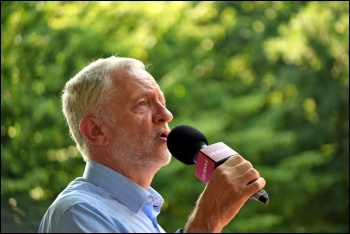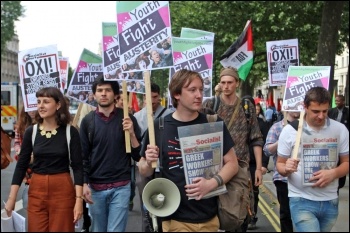The billionaires of the world have increased their combined wealth by almost a fifth in the last year. They now own a staggering $6 trillion – more than twice the UK’s GDP! Josef Stadler, UBS bank’s ‘head of global ultra-high net worth’, said that the “$1 billion question” is how society will react to the concentration of so much money in the hands of so few.
What he means is – how long can they get away with it? Young people today are 43% poorer than their equivalents in 1995. Workers in Britain have had their incomes drop by 10% since the economic crisis of 2007-08. Anger is growing.
Capitalist politicians and commentator have no solutions.
Speaking just before her disastrous Tory conference speech, Theresa May said: “A free market economy… is unquestionably the best, and indeed the only sustainable, means of increasing the living standards of everyone in a country.” But who would believe her?
Even a former government minister and banker recently told the Financial Times: “The underlying promise of western capitalist economies – that a rising tide lifts all boats – has been broken and ‘a better model’ is now needed.”
But it is capitalism, a system that puts profit before people, that is not just broken but incapable of meeting the needs of the vast majority of the world’s populations. Instead it brings crisis, war, poverty and division.
At Socialism 2017 we won’t be relying on bankers or Tories for ideas on how to defend our living standards and fight austerity.
Socialists discuss and debate the lessons of past struggles, the ideas that our movement has developed through experience, and what needs to be done now to change the world.
We discuss to learn from each other to make our movement stronger and better prepared to fight back.
We fight all cuts and austerity, but also go further. As well as supporting nationalisation of rail and mail, we say that the other major monopolies (banks, companies and businesses), need to be brought into public ownership – under the democratic control of working class people.
In this way, the economy could be planned democratically, to genuinely meet the needs and aspirations of the many, not just the few.
Workshops will include plenty of time for everyone to contribute, raise disagreements and ask questions
How can we make Corbyn’s policies real now?
We can’t wait until 2022 for a general election – we need Jeremy Corbyn’s policies now! And the Tories out! From free education, to rent control, to nationalising the railways, to a £10/hr minimum wage – we need to build a mass movement to win these things and force the Tories to call a general election to get them out.
The Tory chancellor, Hammond, recently described Corbyn as a “clear and present danger” – a danger that is to the interests Hammond and his party represent, the capitalist class of bankers and bosses.
This means that although the Tories are completely split and very weak, they will do all they can to cling on to power to keep Corbyn out. They fear that a Corbyn-led government would unleash a movement of working class, middle class and young people to fight for Corbyn’s policies and more – which would challenge their control of the wealth in society.
The Socialist Party has put forward the idea of a mass trade union-led demonstration to smash the Tory pay cap. We also back the call from Socialist Students for an ‘education shutdown’ on budget day. This should be part of building for coordinated strike action across the public sector. A movement on this scale could force the Tories to call a general election, and bring a Jeremy Corbyn-led government to power within months.
But the Tories are not the only split party. A threat to Corbyn’s manifesto also comes from within Labour – the right-wing MPs, councillors and officials who have carried out austerity and attempted to remove Corbyn.
The Labour Party remains ‘two parties in one’ – the radical wing which has been inspired by Corbynism on one side and the pro-capitalist Blairite wing, which includes the majority of MPs, on the other. Although the general election result has forced some of the right-wing Blairites to eat humble pie, it would be a major mistake to imagine that they are now genuine converts to opposing austerity. We all know that Labour councillors continue to vote through cuts.
In fact, the Blairites are now trying to surround Corbyn to force him to retreat from his radical programme. A battle needs to be waged to transform Labour into a socialist and democratic party of workers and young people that can be a reliable body in the fight against austerity.
Sessions on this theme include:
- Local government – the next scene of the anti-austerity battle?
- Labour and the trade unions – introduced by RMT president Sean Hoyle, and Glenn Kelly, Socialist Party industrial organiser
- How can a Corbyn government avoid sabotage? – introduced by Sarah Wrack, editor of the Socialist
- Workers v Bosses: who will win the low pay battle? – a forum with Lewis, McDonald’s striker; Richard Beddows, Birmingham bin strike convenor; and Rob Williams, national chair of the National Shop Stewards Network
Young people need socialism
Today’s 18-year-olds were eight years old at the time of the world economic crisis in 2007-08.
Is it any wonder that they are now ready to resist and are open to socialism?
Generation Crisis has had enough. Unless they fight back, their future is dominated by debt mountains, precarious working and housing horrors. Two-thirds of young people backed Jeremy Corbyn at the general election in an electoral revolt.
Bernie Sanders, who stood for a “political revolution”, is now the most popular politician in the USA, reflecting the rejection of the neoliberalism offered up by the Democrats and Republicans alike.
In the movement against low pay at McDonald’s and in the fight against the repressive Spanish state we are seeing young people to the fore.
Sessions on this theme include:
- How the Student Union defeated education attacks in the state of Spain – introduced by Coral Latorre, general secretary of the Student Union in Catalonia
- Can free education be achieved? How?
- Mental health and young people – how would socialism be different?
- Social media – the good, the bad, the ugly and the revolutionary potential
The Russian revolution and Marxism
At Socialism 2017 we will discuss the Russian revolution 100 years ago. But Socialism 2017 will not be a history lesson!
1917 provides a powerful example of how it is possible for the working class and poor to take their destiny into their own hands and transform the world. We will be discussing the impact of the revolution, and also why the Soviet Union degenerated into dictatorship.
The leaders of the Russian revolution used Marxism as a guide to answer the same questions we face today – how can the working class organise to end injustice, repression and exploitation? Leon Trotsky, a leader in 1917, described the revolutionary party, as the Bolsheviks were, as “the memory of the working class” in that they carried all the lessons and understanding of workers’ struggle and experience to aid the movements they participated in.
The onset of a deep-going world economic crisis, beginning in 2007-08, which capitalism has still not recovered from, has opened up a new period of social and political instability as the opposition of the working class and the youth has grown. These lessons and ideas will be invaluable to these new movements.
Sessions on this theme include:
- What is the legacy of the Russian revolution? We have invited all the so-called experts and ‘sovietologists’ who go on the BBC to denounce the October revolution to debate with us but none have even replied! Peter Taaffe, Socialist Party general secretary, will introduce this session
- We will also discuss: Was Lenin a dictator? Lessons of October: the relevance of Leon Trotsky’s ideas today. From Russia 1917 to Scotland 2017: why do socialists talk about the national question? What can 1917 tell us about the fight for LGBT+ rights? Women and 1917, and more
Working class internationalism
The leaders of the 1917 Russian revolution, Trotsky and Lenin, were clear that the success of the new workers’ state depended on the spreading of the revolution to other countries. They were internationalists – and so is the Socialist Party. We are part of the Committee for a Workers’ International, a world socialist organisation organised in 45 countries.
Our internationalism can have nothing to do with international organisations that pursue war and austerity. For example Nato, which has the push towards military intervention written into its foundations. Or the EU, which bans nationalisation of industries and has pushed the living standards of the Greek people crashing through the floor. Working class internationalism means standing and fighting in solidarity with workers and young people across the world against repression, austerity and war.
That is why the situation in the US, where the election of Donald Trump has provoked huge protests and growing hunger for an alternative. And in the Spanish state, where the movement for a Catalan socialist republic is moving to the next stage. Other examples will feature at Socialism 2017.
Sessions on this theme include:
- Revolution and counterrevolution in the US – introduced by Kshama Sawant, the US’s most prominent and effective elected socialist
- How can the struggle for an independent socialist Catalonia win? – introduced by Juan Ignacio Ramos, general secretary of Izquierda Revolucionaria, the Socialist Party’s sister party, which fights austerity and repression across the Spanish state
- Can the EU be reformed in the interests of the working class?
- Will there always be war in the Middle East? This session will be introduced by Judy Beishon, elected member of the International Secretariat of the CWI (the world socialist organisation to which the Socialist Party is affiliated) who will be recently returned from a visit to the CWI in Israel/Palestine
- We will also have a workshop co-hosted by the Refugee Rights Campaign on the role of trade unions in the fight against racism and for refugee rights
Info
Socialism 2017 is a weekend of discussion and debate hosted by the Socialist Party
It takes place on 11 and 12 November at the Institute of Education, 20 Bedford Way, WC1H 0AL
All the details of speakers, rallies, workshops and debates are available on the website: socialism2017.net
You can also book tickets, accommodation, free creche places and let us know if you will need mobility support. We need this information by 6 November. Please email [email protected] if you have any queries
As well as the rallies and workshops, we will have the following extra events:
Socialist Books will host launch events to celebrate its first two publications.
Socialism bookshop, lower ground floor on Saturday 11 November:
2-2.30pm: Peter Taaffe will introduce his new book, From Militant to the Socialist Party, which details the Blairite takeover of the Labour Party and the processes which prefaced the world economic crisis of 2007-08
5-5.30pm: Judy Beishon who wrote the introduction to Socialist Books’ new edition of Trotsky’s essential Lessons of October, will introduce the central ideas of the book and be available to sign copies
On Sunday 12noon – 12.45 there will be readings by renowned writers Meena Kandasamy and Edward Wilson. Room tbc











